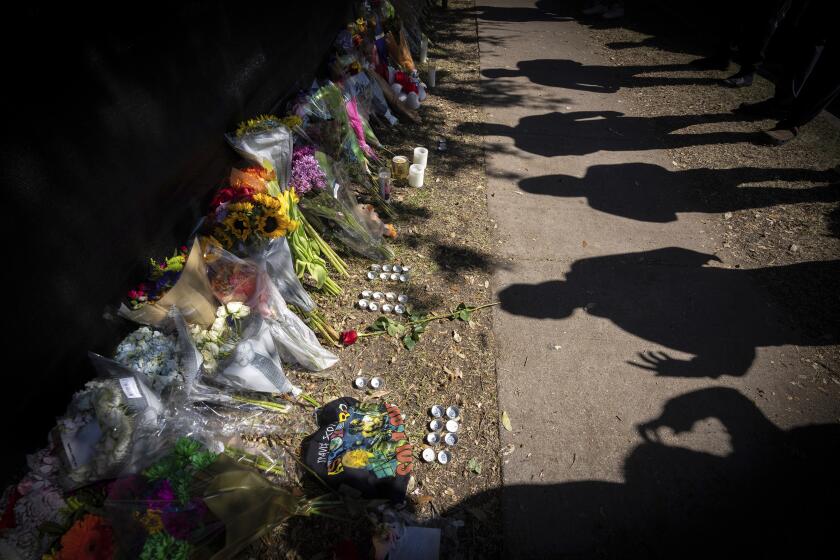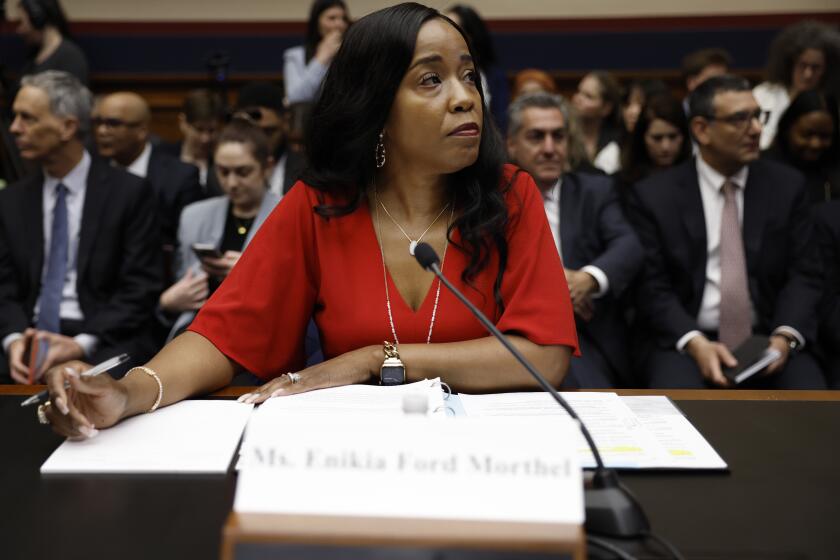Darfur Crisis Stokes Anti-U.S. Sentiment
Umar Mohammed Ahmed traveled with his terrible memories as he sprawled on the top of an overloaded truck rumbling over the corrugated road from Darfur to Khartoum. He escaped fear but not anger.
During that weeklong trip, Ahmed, 38, thought often about his wife and five children left behind, his slain aunt and a 10-year-old girl named Kaltuna who was raped by militia members on her way to fetch water. He thought about people shot down and the taste of smoke from his burning village, Deleij, in remote West Darfur.
Once safe in the capital, Khartoum, he had only to listen to government-controlled radio or watch television to reignite his rage against a government that had betrayed him.
“What I heard on TV is not the reality. I heard on TV that the situation in Darfur is all right, but it’s not,” he said. “I feel angry when I see the government saying things that aren’t true. Most people have got no idea that’s going on. They just believe what they hear on the TV.”
U.S. pressure on the government of Sudan to act in Darfur has triggered a flurry of anti-American rhetoric from hard-liners in Khartoum, and those feelings have found ready believers in a Muslim society unhappy with the United States because of the Iraq war and fears that it covets Sudan’s oil. Western diplomats and human rights groups believe that some of the most strident government officials are responsible for unleashing the Arab militias that have carried out atrocities in Darfur, the nation’s vast western region.
The rhetoric hardened after the U.S. Congress described attacks against black tribes in Darfur as genocide and the United Nations Security Council called in July for Sudan to protect people there or face international action.
Students at Khartoum University are some of the most politically active and polarized of Sudanese. The sight of a Western journalist with a notebook conjured an instant crowd of angry students, each with his own opinion on the Darfur situation.
“Really, there’s no problem in Darfur,” said law student Mohammed Gilal, 27. “If there’s any problem, America is behind it,” he added, expounding on one current conspiracy theory that America armed the rebels who rose up in Darfur last year, aiming to gain control of Sudan and its oil.
Mohammed Salih, 23, a computer science graduate, said the West should stay out of Darfur.
“We don’t want any interference from these countries. I hate America because they put so much pressure on other countries, on Iraq too. I think there will be the same problem with us,” he said.
Sudan was once a haven for Al Qaeda leader Osama bin Laden, but the government’s cooperation with the U.S. on terrorism since Sept. 11 ushered in a new relationship.
The U.S. Embassy reopened a year ago after being closed for five years -- though no ambassador has arrived -- and America played an active role in peace talks between the government and rebels to end a 21-year civil war in the south.
Sudan was inching toward being removed from Washington’s list of state sponsors of terrorism after 11 years, and U.S. sanctions, in place since 1997, were about to be lifted. If not for the Darfur crisis, Sudanese President Omar Hassan Ahmed Bashir and southern rebel leader John Garang probably would have been feted at the White House by now, diplomats said.
After Sudan’s army failed quell to a separate rebellion by the Sudanese Liberation Army and the Justice and Equality Movement early last year, the government supported Arab militias, known as janjaweed, to fight the Darfur rebels, who came from black farming tribes. Arab herdsmen had long been their rivals for declining water sources and land for pasture. With the backing of Sudan’s military, the militias launched a campaign of terror, killing, raping women, burning villages, stealing livestock and driving the people from their land, using epithets including “slaves.”
Given the racial overtones and the government military support for the campaign, which seemed designed to dispossess the Fur, Massalit and Zaghawa tribes, international human rights groups dubbed it “ethnic cleansing.” Unlike genocide, there is no international legal definition of ethnic cleansing, nor any legal obligation for other nations to act.
One diplomat in Khartoum said that late last year, when the scale of the Darfur crisis was becoming clear, U.S. and British officials were reluctant to support the idea of a U.N.-sponsored humanitarian assessment for fear of riling the Sudanese government and upsetting the delicate north-south peace talks that seemed poised for resolution.
But even the limited Western response has met resistance. The upsurge in anti-American rhetoric, some fear, sends a message to extremists in Sudan that such attacks are back in favor with the government. The hard-liners form the core of the government, around First Vice President Ali Osman Mohammed Taha, who handles the day-to-day administration and is believed by Western officials to be responsible for the events in Darfur. Western diplomats argue that he must have known the general thrust of the policy pursued in Darfur by the hard-liners, whether or not he was aware of the extent of the atrocities.
But when Taha traveled to Nyala, the capital of South Darfur, in June, he was said to have been shocked by what he saw. Days later, the state’s governor was sacked.
The hard-liners’ policy has failed. The rebels, instead of being crushed, now have an international stage to air their grievances. Sudan will probably be forced to accept a force of several thousand African Union troops and monitors with a broad mandate to investigate abuses in Darfur, instead of the 300 African Union soldiers and 150 monitors now stationed there, who have turned out to be less compliant than Sudan perhaps expected.
Faced with a Muslim government that allowed the slaughter of thousands of its Muslim citizens, even key allies in the Arab world have been lukewarm toward Sudan -- publicly supportive, but privately urging it to comply with what is seen as a soft Security Council resolution.
“Whatever they [the government hard-liners] had in mind in Darfur, it didn’t work out the way they wanted. I am sure that in a few weeks there will be a very large African Union force there,” one Western diplomat in Khartoum said. “What the international community has been doing with very intense pressure is limiting the playing field of the government. Step by step they have less space to operate. They have lost sovereignty, and they have lost face.”
With the hard-liners on the defensive, Foreign Minister Mustafa Osman Ismail, considered a leading dove, pushed for Sudan to lift the barriers to international humanitarian aid and to sign a cease-fire with the Darfur rebels in April. But attacks have continued.
Although human rights groups continue to push for sanctions, most Western officials think they will be counterproductive, undermining the ability of Ismail and more liberal elements in the Sudanese government to push forward with international engagement on Darfur and other issues.
“Ismail came in and worked with the international community to actually get some things done,” another diplomat said. “That’s improved his standing in the government. But he has to be able to prove that engagement with the West and cooperation over political processes is worth it. If he doesn’t, he and his followers will lose the argument.
“He has to be able to prove that that gets recognized and the international community responds to that with development assistance and humanitarian assistance.”
The U.N. special representative on Darfur, Jan Pronk, recently spoke of Western “negligence” of Sudan -- decades of neglect that fueled poverty and a sense of injustice, and perhaps helped create the circumstances for violence. It was time, he said, for the international community to put its money where its mouth was, with a huge boost in support for humanitarian programs in Darfur and programs to support the embryonic peace in the south.
Sudan, with its tightly controlled media parroting the government line, has so frequently fanned the sense of injustice that it may take time for the sense of national injury to fade.
Ilham Abdullah, 24, fled the town of Tawila in North Darfur several months ago, fearing a possible attack by militias. As she recalled her story, a curtain of flies rose from the dirt floor of the small tea shop that is her toe-hold on a new life. She brought herbal tea and sweet coffee flavored with cinnamon and ginger, placing a fire of thick perfumed wood smoke under her guests’ noses.
She is Fur, one of the tribes attacked by the militias, yet here in Khartoum, relying on television and radio for her news, she echoed the response of many government officials.
The problem in Darfur is “normal,” she said. “It’s happened before. We can solve these problems without American hands. These problems started small, but the Americans want the problems to be big so they can get into Sudan, just like in Iraq.”
She likened America -- the largest donor of aid in the Darfur crisis -- to a tyrannical, controlling mother.
“When America helps people and gives food, they always make a big noise on television and radio. If America wants to help, let it help in silence, without boasting.”
More to Read
Start your day right
Sign up for Essential California for news, features and recommendations from the L.A. Times and beyond in your inbox six days a week.
You may occasionally receive promotional content from the Los Angeles Times.






